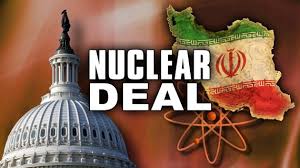April 2016
Iranian President Hassan Rouhani visited Pakistan in late March.
Arrangements were made beforehand to establish further economic relations and
expand diplomatic ties, while knowing Pakistan is a member of the Islamic
countries’ coalition spearheaded by Saudi Arabia. This alliance is specifically
formed to prevent Iran’s terrorist measures in the region.
In this visit Rouhani sought to differentiate his government’s stance
on Syria in comparison to the position promoted by Iranian Supreme Leader Ali
Khamenei on exporting terrorism. To this end at a press conference he said,
“Negotiations are the basics of reaching a solution and transitional period to
specify the future of Syria.” These remarks are interesting, considering the
fact that Iran has to this day stood behind the Syrian dictator to this very
day. Words such as “transitional period,” as emphasized by the Syrian
opposition, regional states and Western countries, mean Bashar Assad must be
set aside.
As his remarks continued, Rouhani overtly called for dialogue with
Saudi Arabia and resolving issues between the two countries through negotiations.
“… the JCPOA can be an example in this regard, and we can use this
solution to resolve other dilemmas in the region.” Whereas Saudi Foreign
Minister Adel al-Jubeir and other officials in this country have time and again
announced Riyadh will only negotiation with Tehran if this regime evacuates
Syria, and brings an end to all its meddling across the region.
Therefore, Rouhani has sent a message that his regime is ready to give
major concessions regarding its regional policy, naming this as “JCPOA2”.
The remarks made by Rouhani should have logically raised much anger
amongst the Khamenei faction. However, it is utterly surprising that in this
regard we are witnessing no intense backlash against Rouhani. This becomes more
meaningful when we recall how Khamenei in his lengthy March 20th
speech, without referring to Syria, moaned of further “JCPOA” agreements
regarding his regime’s policies in the region. Without distinctly disavowing
the subject he said, “We reached an agreement on the nuclear issue. We named it
the JCPOA. Another such agreement regarding the region, the country’s
constitution, JCPOA 2, 3, 4 and …”
The question is was Rouhani tacitly accepting the
“transitional period” a mere individual move, or does it rely on deeper
realities and even discussions amongst the regime’s senior brass?
Ali Khorram, a senior member of the Rafsanjani
camp, who considered Russia pulling out of Syria as “deception” against the regime,
admitted this development led to “Iran’s role in the region to wane” and
currently “Iran’s strategy has remained brought to an end.” He then more
explicitly said, “At the negotiating table Turkey and Saudi Arabia can even
impose Bashar Assad giving up his power, and it can be said that they are
currently the winners in Syria.”
This admission resembles the beginning of the end
of Khamenei’s “strategic depth” strategy. Prior to this Khamenei had described
the Revolutionary Guards killed in Syria as “defenders of sacred sites” and
added, “If they hadn’t fought… we would have been forced to fight here in
Kermanshah and Hamedan, and all other provinces.”
Khamenei clearly realizes that day is near.
Therefore, in his speech on March 20th he forecasted the future of
his regime as such, “If we retreat, retreat will lead to such ends… this is
what I have said many times. This is a change in the Islamic republic’s
morality and ethics.”

No comments:
Post a Comment